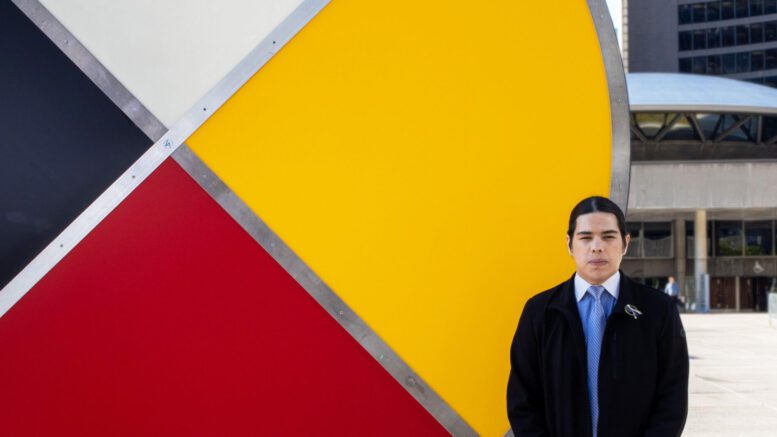As Toronto’s mayoral byelection approaches, local Indigenous leaders are urging candidates to prioritize fostering a strong relationship from the outset with the city’s Indigenous communities.
“There’s nothing worse than being invited to the table when they’ve already developed a program and say ‘here it is’ — that’s the truest form of colonialism that there is,” said Frances Sanderson, executive director of Nishnawbe Homes and president of the Toronto Aboriginal Support Service Council (TASSC).
“We want to be invited to the table before anything is decided,” Sanderson said, “We want to have a say on how it’s done.”
TASSC is a nonprofit research, policy and advocacy organization comprising of 21 Indigenous-led organizations that make up a majority of the designated social services providers for Indigenous people living in Toronto.
“We had an extremely good relationship with the former mayor, Tory, as well as with the former city manager, Mr. [Chris] Murray,” Sanderson said. “So we are in the process of developing that relationship again with the city manager [Paul Johnson], and hopefully with the new mayor.
“We’re open to that — we’re banking on it.”
Sanderson said that while the city has made significant strides in offering support to its Indigenous community, there is still much work to be done.
“I’d like to see the new mayor pick up the programs and run with them; improve on them; open them up,” she said. “I’d like them to take the lead from the strong presence of former politicians and not throw it aside, not put in on the shelf, not wait for a ‘proper’ time.”
The Indigenous population in Toronto is the largest in any city in Ontario, and the fourth largest in any city in Canada.
Tory’s legacy
Sanderson, who collaborated frequently with former mayor John Tory during his time in office (2014-2023), said Tory was instrumental to the city’s progress towards strengthening ties with its Indigenous community.
“When he [Tory] first came to office, he didn’t know us,” she said. “Over the years that he was there, we brought him into it. We did it in a slow, thoughtful way: we introduced him to our culture; to our traditions; to our circles; to our powwows; to our committees — and he took to it.”
“He understood the relationship that should have been in place all along, and he helped develop it,” Sanderson said. “He unabashedly embraced supporting and working together with the Indigenous community.”
During the Métis Nation of Ontario Annual General Assembly in August 2022, Tory issued a highly-publicized apology on behalf of the city of Toronto for historic injustices against the Métis people (citing Toronto’s direct involvement in the Northwest Resistance in 1885).
Watch: John Tory’s public apology to the Metis
Tory also participated in the creation and implementation of the city’s first Reconciliation Act Plan (RAP) in 2022, which will guide Toronto’s actions to advance truth, justice and reconciliation for the next 10 years.
According to Selina Young, director of the City of Toronto’s Indigenous Affairs Office, the RAP is about strengthening the Toronto Public Service “family” to ensure that its 42,000-plus staff can better serve Indigenous residents, “as well as addressing barriers and colonial practices that are embedded in city policies, programs and processes.”
“With that action plan, the City of Toronto is taking a leadership role in advancing truth, justice and reconciliation, working with First Nations, Inuit and Metis, and trying to contribute to the momentum of reconciliation across the country we call Canada,” Young said.
Reconciliation as a municipal responsibility
Tory may have been a strong ally for the Indigenous population in Toronto, but the lack of mention of truth and reconciliation amongst his potential successors to date has some members of Indigenous communities in the city feeling skeptical.
“I have not heard anything about truth and reconciliation from any of the mayoral candidates. And I think that’s because they believe — and everyone has this idea — that truth and reconciliation is not a municipal issue,” said 20-year-old Michael Peters, chair of the Toronto Indigenous Youth Council and student intern for a member of provincial parliament.
“Regardless of if it’s a municipality, if it’s a province, if it’s a country, all of it is on First Nations land,” Peters, who is Anishinaabe from Long Plain First Nation, said.
A scan of recently published news stories did not reveal any mention of truth and reconciliation by the mayoral candidates.
Young said she could see why reconciliation is widely considered a federal issue.
“Because of colonial practices, there is this perception of, you know, First Nations, Inuit, Métis, as wards of the state – and that state is the federal government,” she said.
“But, all levels of government have contributed to colonization; have contributed to the problem,” Young said, “and therefore, need to step in, and work with Indigenous partners to figure out how to move forward.”
‘Develop a relationship, develop a partnership’
Indigenous communities in Toronto are among the city’s most marginalized, with intergenerational trauma related to and occurring alongside disproportionately high levels of unemployment, food insecurity, housing insecurity, substance abuse, and mental illness.
“We can never be homeless on our land,” said Peters, “but a lot of our youth are overrepresented in the houseless population.”
More than 90 per cent of the Indigenous population in the city lives below the low income cut-off, according to City of Toronto’s 2016 Health Counts study.
“We are usually lumped into the homeless, we’re lumped into those who have mental health issues, are lumped into those who are looking for jobs, are lumped into those who are looking for education,” said Sanderson.
Sanderson said that whoever is elected of the 102 candidates running for Toronto’s mayor, it is their duty to make themselves known to Indigenous communities in the city.
“Develop a relationship, develop a partnership, develop a conversation,” she said, “that is interwoven through respect, truthfulness, and a desire — a passion — to do better than before.”


